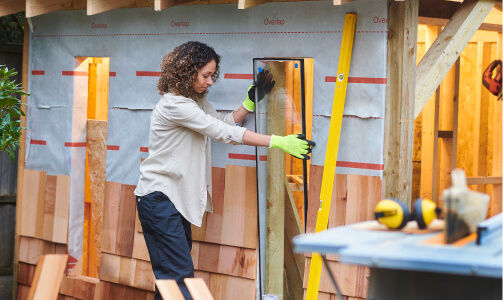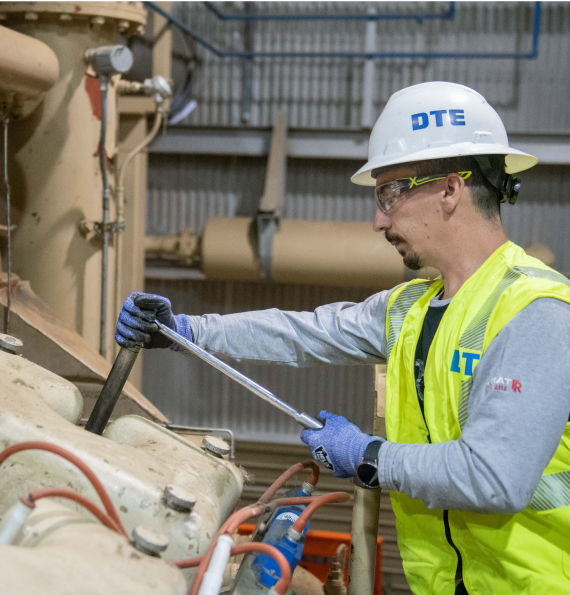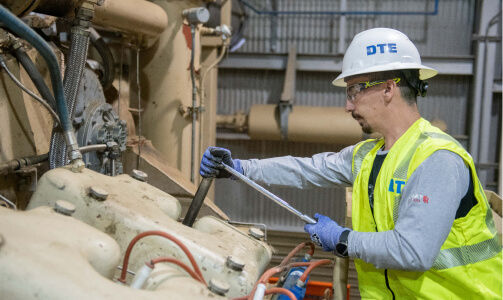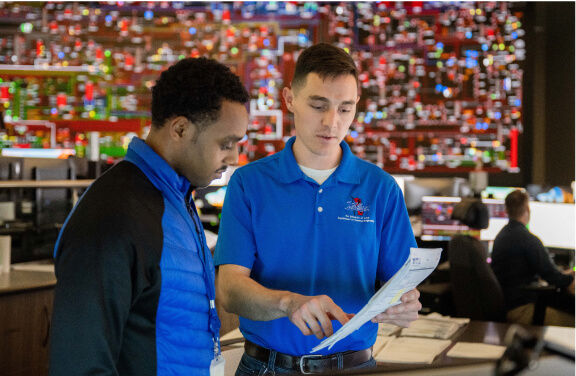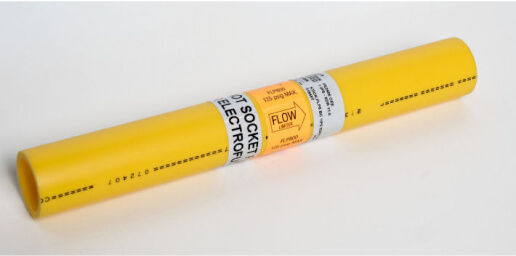Pipeline Safety
Our commitment to safety extends 41,500 miles.
Our network of underground natural gas pipelines throughout Michigan safely and reliably delivers natural gas to 1.3 million residential and business customers.
To maintain safe operation of the system, our Pipeline Integrity management program, in conjunction with federal and state regulations, ensures that our natural gas network is regularly inspected and that we perform regular maintenance work, such as leak surveys and corrosion control. This ongoing process helps us continue to deliver natural gas safely and reliably to every customer.
How to Identify a Pipeline
Buried pipelines are often indicated by ground markers (see image). We use these markers to indicate approximate, but not exact, locations of pipelines.
Whether or not you see these ground markers in an area you plan to dig, be sure to call at 811 visit MISS DIG 811 prior to digging or excavating.
Encroachments and Build Overs
Encroachments and build overs that prevent DTE from conducting required operational and maintenance activities are prohibited. New decks, garages and sheds are examples.
Encroachments: These are structures, outdoor assembly areas, excavations or other activities within 220 yards of a pipeline or the Potential Impact Radius (PIR) of a transmission pipeline (whichever is greater) or within a pipeline right-of-way or easement. PIR defines the area within which a potential failure of a pipeline could have significant impact on people or property.
Build Overs: These are structures that may interfere with or affect the safe operation and maintenance of a pipeline. Maintenance work could include surveys, repairs and access to a gas shut-off valve or meter.
Pipeline includes all DTE-operated gas lines and gas facilities.
Storage and Delivery
DTE operates and maintains a system of underground natural gas storage facilities capable of storing 140.6 billion cubic feet of gas, enough to fill Ford Field more than 900 times. This capability helps ensure an ample supply of affordable natural gas for customers all year.
In addition, DTE’s 44 compressor units produce 136,795 horsepower - equivalent to 297 Mustang GTs - to help deliver natural gas to customers throughout Michigan.
Control Room
DTE controllers monitor our 41,500-mile natural gas pipeline system around the clock. This work includes analyzing a constant flow of data from more than 4,500 points along our system.
Changes in pressure and other vital data are transmitted from pipeline sensors to monitors that update our controllers in real time. Should an issue arise, controllers can close one or more of our 140 remote-control valves to shut the flow of gas at key locations in the pipeline system.
Pipeline Safety Resources
Gas Leak | |
| If you smell or suspect a gas leak, leave the area immediately. Once you are in a safe place, call 911 and then call our Gas Leak Hotline at (800) 947-5000. | |
Fuga de Gas
Si huele o sospecha que hay una fuga de gas, abandone la zona inmediatamente. Una vez que se encuentre en un lugar seguro, llame al 911 y, a continuación, llame a nuestra línea directa para fugas de gas al (800) 947-5000.
تسرب الغاز
في حال شممت رائحة غاز أو شككت بوجود تسرب، غادر المكان على الفور. عندما تصل الى مكان آمن، اتصل على الفور بالرقم 911 وثم اتصل بخطنا الساخن المخصص لتسرب الغاز على الرقم 5000-947 (800).
Pipeline Safety
An extra measure of safety.
Excess flow valves help reduce the risk of accidents.
Excess flow valves are an additional safety feature on natural gas service lines to limit the effects of accidental damage to a pipe.
The excess flow valve is installed on the service line as near as possible to the connection at the gas main. If there is accidental damage to the service line, an excess flow valve will reduce or stop the flow of natural gas.
Excess flow valves help reduce the risk of accidents.
Excess Flow Valve Installation
We are currently installing excess flow valves on new and upgraded service lines for most single-family, multi-family and small commercial buildings.
You may request to have an excess flow valve installed on the existing service line to your building if you meet specific requirements. There is a $600 charge for installing an excess flow valve.
Gas Leak | |
| If you smell or suspect a gas leak, leave the area immediately. Once you are in a safe place, call 911 and then call our Gas Leak Hotline at (800) 947-5000. | |
Fuga de Gas
Si huele o sospecha que hay una fuga de gas, abandone la zona inmediatamente. Una vez que se encuentre en un lugar seguro, llame al 911 y, a continuación, llame a nuestra línea directa para fugas de gas al (800) 947-5000.
تسرب الغاز
في حال شممت رائحة غاز أو شككت بوجود تسرب، غادر المكان على الفور. عندما تصل الى مكان آمن، اتصل على الفور بالرقم 911 وثم اتصل بخطنا الساخن المخصص لتسرب الغاز على الرقم 5000-947 (800).

